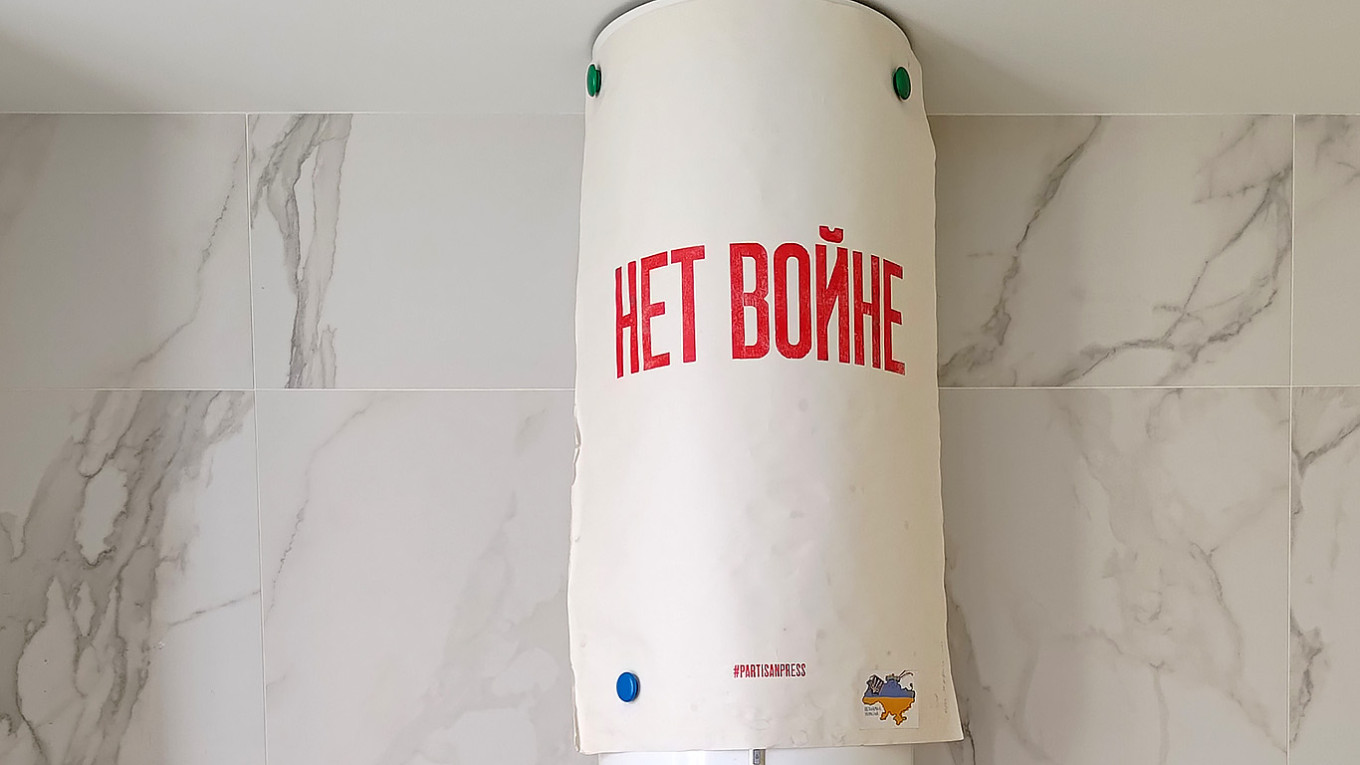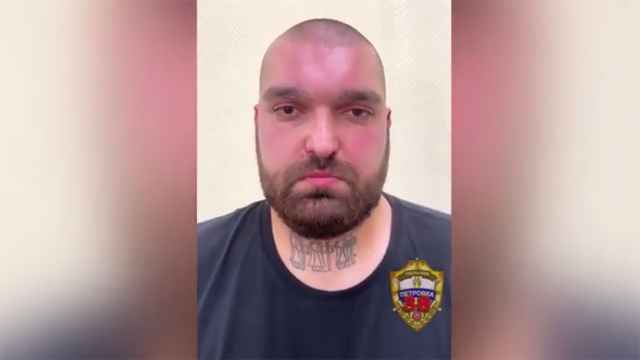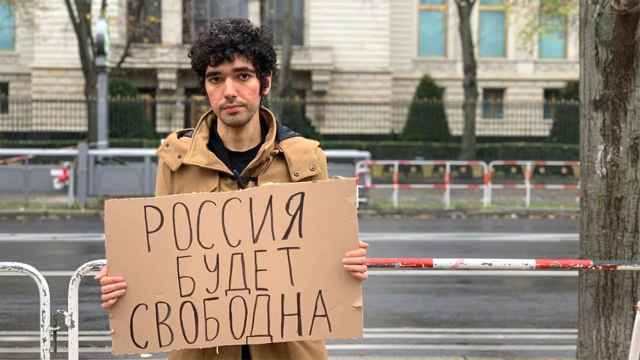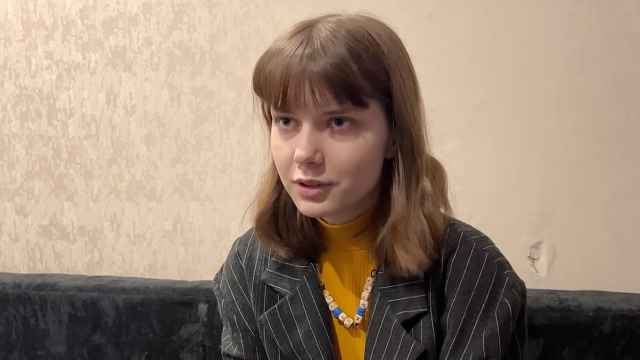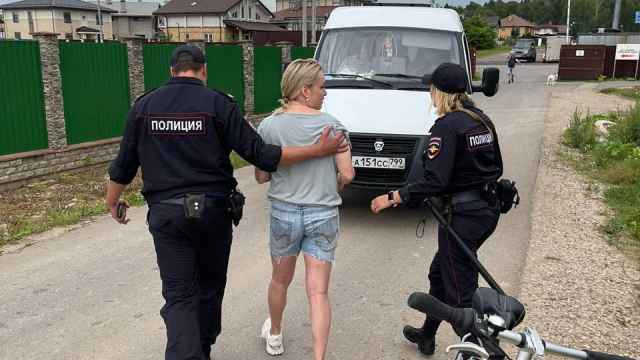MOSCOW — "I will get an anti-war tattoo for every year of the war. Since the war never ends, I will mark each anniversary," said Zhenya, pointing to a tattoo reading Net Voyne (“No to war”) on an exposed part of their body.
In today's Russia, these two words can land one in prison for up to seven years.
“My partner did my first tattoo in our kitchen during the first week of the war. My friend, who also keenly felt the war … tattooed themself with a peace sign, and I tattooed Net Voyne," Zhenya, 33, a manager at a Moscow bar, told The Moscow Times.
Zhenya’s tattoo occasionally catches the attention of passersby who might otherwise feel alone in their anti-war views due to intense military propaganda.
“I ride on the metro, and a girl tells me, 'Thank you so much.' I sit in a bar drinking beer, two young girls come up to me and say, 'You just saved us right now. Everyone is silent, no one talks about it [war] — it was very important for us to see this’," Zhenya recalled.
The Moscow Times spoke to three people who have gotten anti-war tattoos since the invasion.
Their names have been changed due to the risk of prosecution for criticizing the war. To ensure anonymity, the images and exact locations of their tattoos have not been disclosed.
Shortly after invading Ukraine in February 2022, Moscow rammed a package of repressive laws through parliament to silence domestic opposition to the war.
The laws, which ban “discrediting” and spreading “fakes” about the country's Armed Forces, effectively outlaw any criticism of the Kremlin’s military offensive, with lengthy prison terms for violations.
Between the invasion and May 2024, Russia has carried out over 20,000 detentions for anti-war actions and statements. As of late June, 966 individuals have been criminally prosecuted, according to the independent OVD-Info rights project.
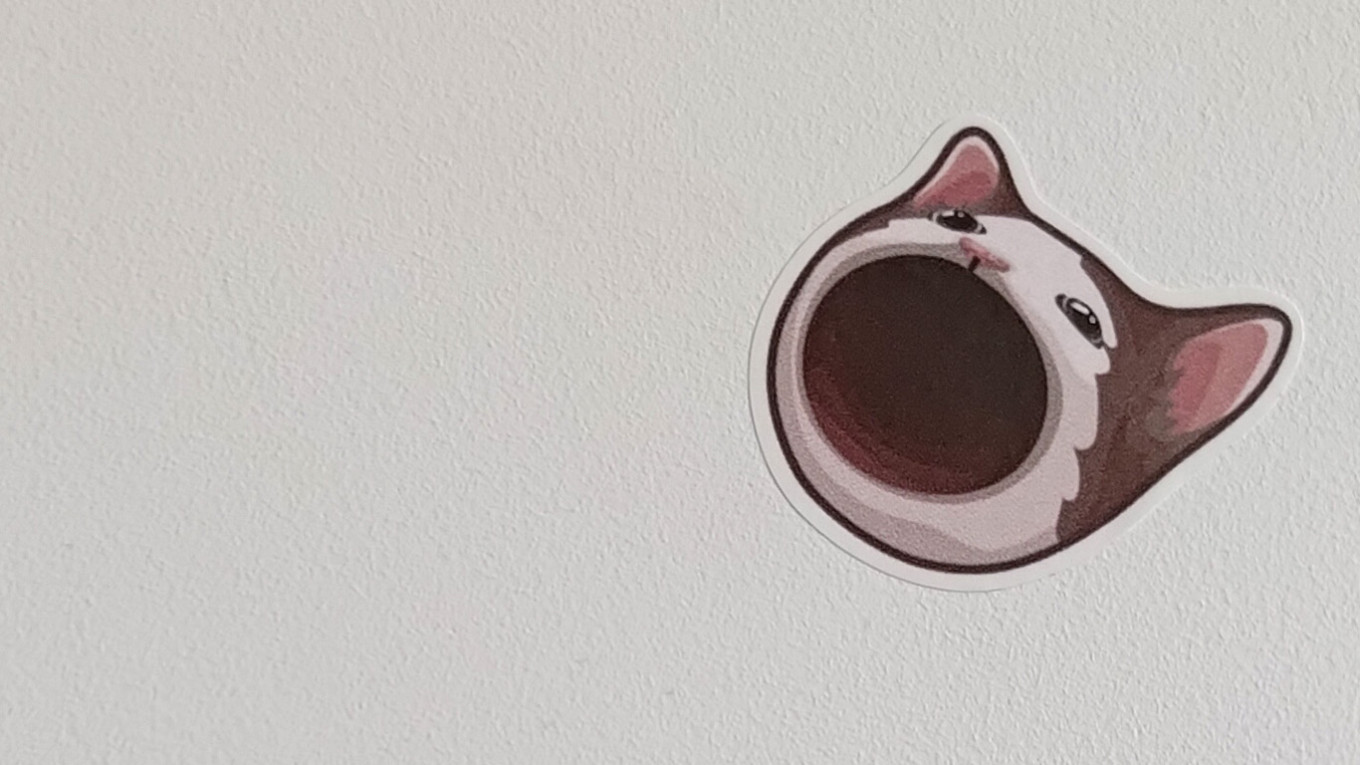
This has not deterred some from finding ways to channel their suppressed feelings, especially as a fierce police crackdown on anti-war rallies in the early weeks of the war has ended any chance at protesting on the streets.
“Protesting did not work: as soon as people gathered, they were immediately dispersed. The city was full of police vans. … That really depressed me,” Zhenya said of their attempts to protest in the early days of the war.
Since then, Zhenya’s collection of tattoos has only grown. First, they got a translation of Net Voyne in Ukrainian, and this year, they got two tattoos inspired by Kremlin critic Alexei Navalny, who died in prison in February.
The real number of Russians who oppose their country’s war remains unknown since wartime censorship makes polling unreliable, experts say. When asked about their attitude toward the war, the public tends to give safe answers — those that do not lead to prosecution — while up to 95% simply refuse to talk to pollsters.
Banned banner
In Zhenya’s sunlit apartment, a poster dated Feb. 25, 2022, hangs on the kitchen hood, offering a constant reminder of the grim reality of the ongoing war.
Showing the banned words Net Voyne, similar to Zhenya’s tattoo, the poster had adorned the bar where Zhenya works in the early days of the invasion — until police raids targeted other bars displaying the same placard.
“The guys from Partisan Press [printing studio] made a batch of posters — shortly after, they were busted. The poster hung at the entrance of [our] bar, in the most visible spot, for two or three days,” Zhenya said.
Zhenya has to take the poster down whenever a handyman comes over.
“I took it home and put it on my fridge with the hope that I would return it to its place in the bar when it’s possible. I still hope for that,” they said.
![A pedestrian crossing button at a traffic light in Moscow with the word "Wait," where someone has added "Mira" ["for peace"], making it read "Wait for peace." MT](https://static.themoscowtimes.com/image/1360/5d/GridArt_20240624_1135578.jpg)
Many Russians have been fined for “discrediting” the army after displaying the same Net Voyne message on their clothes, car stickers or social media posts.
Repeated violations within a year — or violations combined with other offenses like vandalism or spreading “fakes” about the army — lead to criminal charges and prison time.
Even wearing clothes or shoes in the blue-and-yellow colors of the Ukrainian flag can result in detention. Last month, a Muscovite was fined for having blue and yellow-dyed hair, which the court deemed "visual propaganda.”
Nevertheless, Zhenya has carried a marker with them for over two years so they can write anti-war messages “all over the place.”
“I wrote Net Voyne on the building under my windows. It stays up for two or three days, then the janitor comes and erases it — I write it again," they said.
Being able to write this message in public helped lift Zhenya’s spirits. Yet they have not done it as much since realizing the risk of being caught by Moscow’s extensive CCTV networks and sophisticated facial-recognition system.
"It ended a few months ago when I drunkenly wrote Net Voyne in my elevator,” Zhenya recalled. “It was nice to ride in an elevator where Net Voyne was written for a few months. Then someone crossed it out.”
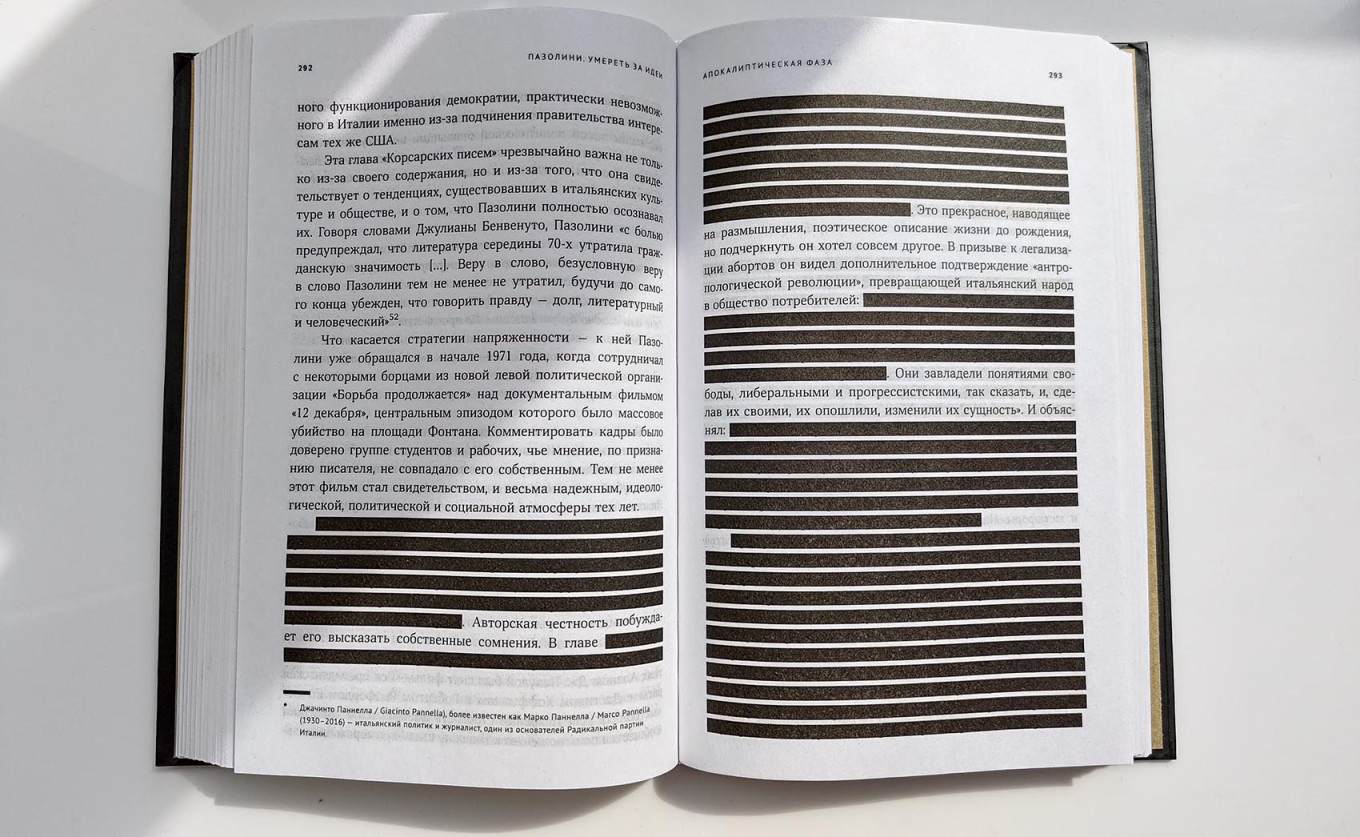
On the war’s first anniversary, Zhenya expressed their feelings about the war on social media.
"Anger, resentment, aggression — all the things I keep suppressing inside myself — it's all bubbling up inside me,” they told The Moscow Times when describing their post.
For the third year in a row, Zhenya has found an outlet for their emotions in these acts of silent resistance. They are not the only one.
Way to cope
Veronika, 35, had dreamed of getting a tattoo since she was a teenager. She decided she was finally ready when the war started and made life “emotionally unbearable.”
“Life suddenly became fragile. We have today and there might not be a tomorrow,” Veronika, a content marketing manager, told The Moscow Times.
After the government made it impossible to speak out about “all the horrors and injustices happening around,” and Veronika’s emotions started taking a toll on her health, she needed to find a way to cope.
“One of my tattoos, the dove of peace, is usually hidden beneath my clothes,” she said. “Nobody can see it, but it reflects my views and values and is very important to me.”
Veronika has gotten a total of seven tattoos since her first one in November 2022.
“I hope that someday we will live in a proper world without cruelty, violence and this stupid war. I believe in this and strive to fight against darkness and ignorance around me as best I can,” she said. “Tattoos are like a daily reminder not to give up.”
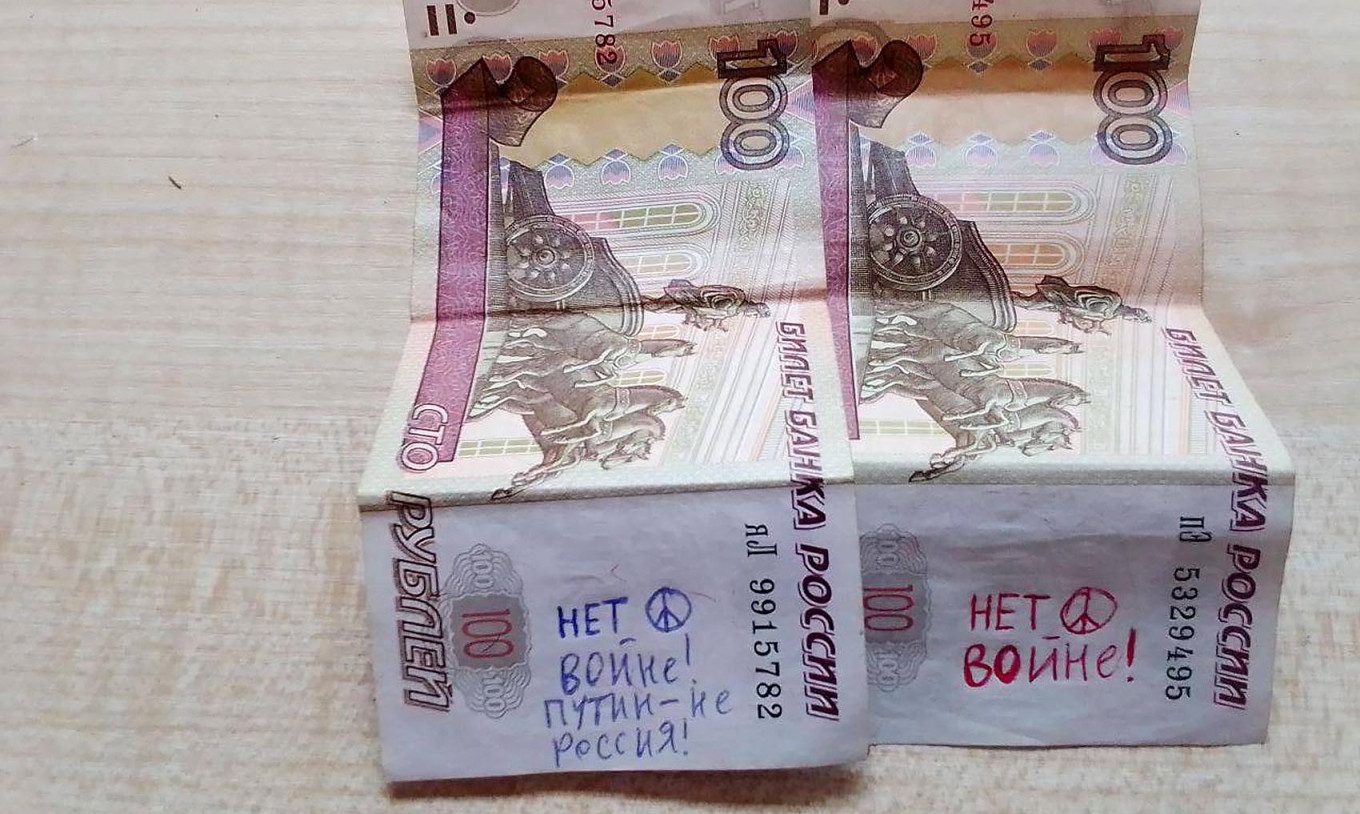
For Natalia, a 25-year-old journalist, getting two tattoos in August 2023 became a way to express her values. One depicts a peace sign and another the planet Earth, both symbolizing mir — a Russian word that can mean both “world” and “peace.”
"While I’m in Russia, I cannot publicly state that I am against the war, that I consider it barbarism and a heinous crime,” Natalia told The Moscow Times.
“Of course, this [tattoo] will not stop the war at all. But for me, it is a way to preserve my humanity and constantly remember that the norm is peace, meaning a world without war."
War talk
The war has strained relationships between families, friends and lovers in Russia with opposing views on the Kremlin’s invasion.
Zhenya once went on a date that soured as soon as the war came up in conversation.
“I asked the person how things are with the military enlistment office. And they were like, ‘Yeah, everyone is over it [war] already, we have gotten used to it’,” Zhenya said.
“The date ended right there."
Zhenya sees that kind of attitude as a coping mechanism in itself.
“I do not have the right answer for how someone should feel and think. I cope, among other things, through conversations. Some cope by forgetting,” Zhenya said.
The war has also created tensions in Zhenya’s family.
“My own uncle tells me straight to my face that Kyiv should be carpet bombed,” they said. “I cannot pretend he did not say that to me and then go on eating the same porridge and drinking vodka together.”
While some of Zhenya’s acquaintances suffer from war fatigue, others are ready to speak about it.
“At home and my parents' dacha, I can speak freely with everyone and feel supported. I am very lucky.”
Future?
When asked about whether they worry about their tattoo showing in public, Zhenya replied, “I am tired of being afraid to provoke someone.”
Given their LGBTQ+ identity and history of being assaulted in Russia on three occasions, Zhenya is already familiar with “these looks” that have followed them their entire life — for simply being themself.
“The thing is, they can pin a [criminal] case on anyone for anything. Especially on me. And if they want to, they will find something,” they said.
The surge of violent rhetoric that the war has unleashed in Russia has only added to Zhenya’s feeling of insecurity.
The end of the war will not necessarily put an end to these worries.
“After the war, it is unclear what will happen. Most likely, it will be very bad. I want to get to [this post-war future] already so I can deal with it. After that, maybe someday things will be normal [in Russia]."
Yet the main reason why Zhenya is eagerly awaiting the end of the war is the fact that “people are dying on the front lines.”
Though they have been attempting to leave Russia since 2011, Zhenya is staying put for now, as their work, family and partner are all rooted here.
“Do I think I will witness anything good in Russia in my lifetime? I am not sure,” Zhenya said.
“Do I think I will live to see the end of the war? Yes. I hope so.”
A Message from The Moscow Times:
Dear readers,
We are facing unprecedented challenges. Russia's Prosecutor General's Office has designated The Moscow Times as an "undesirable" organization, criminalizing our work and putting our staff at risk of prosecution. This follows our earlier unjust labeling as a "foreign agent."
These actions are direct attempts to silence independent journalism in Russia. The authorities claim our work "discredits the decisions of the Russian leadership." We see things differently: we strive to provide accurate, unbiased reporting on Russia.
We, the journalists of The Moscow Times, refuse to be silenced. But to continue our work, we need your help.
Your support, no matter how small, makes a world of difference. If you can, please support us monthly starting from just $2. It's quick to set up, and every contribution makes a significant impact.
By supporting The Moscow Times, you're defending open, independent journalism in the face of repression. Thank you for standing with us.
Remind me later.


